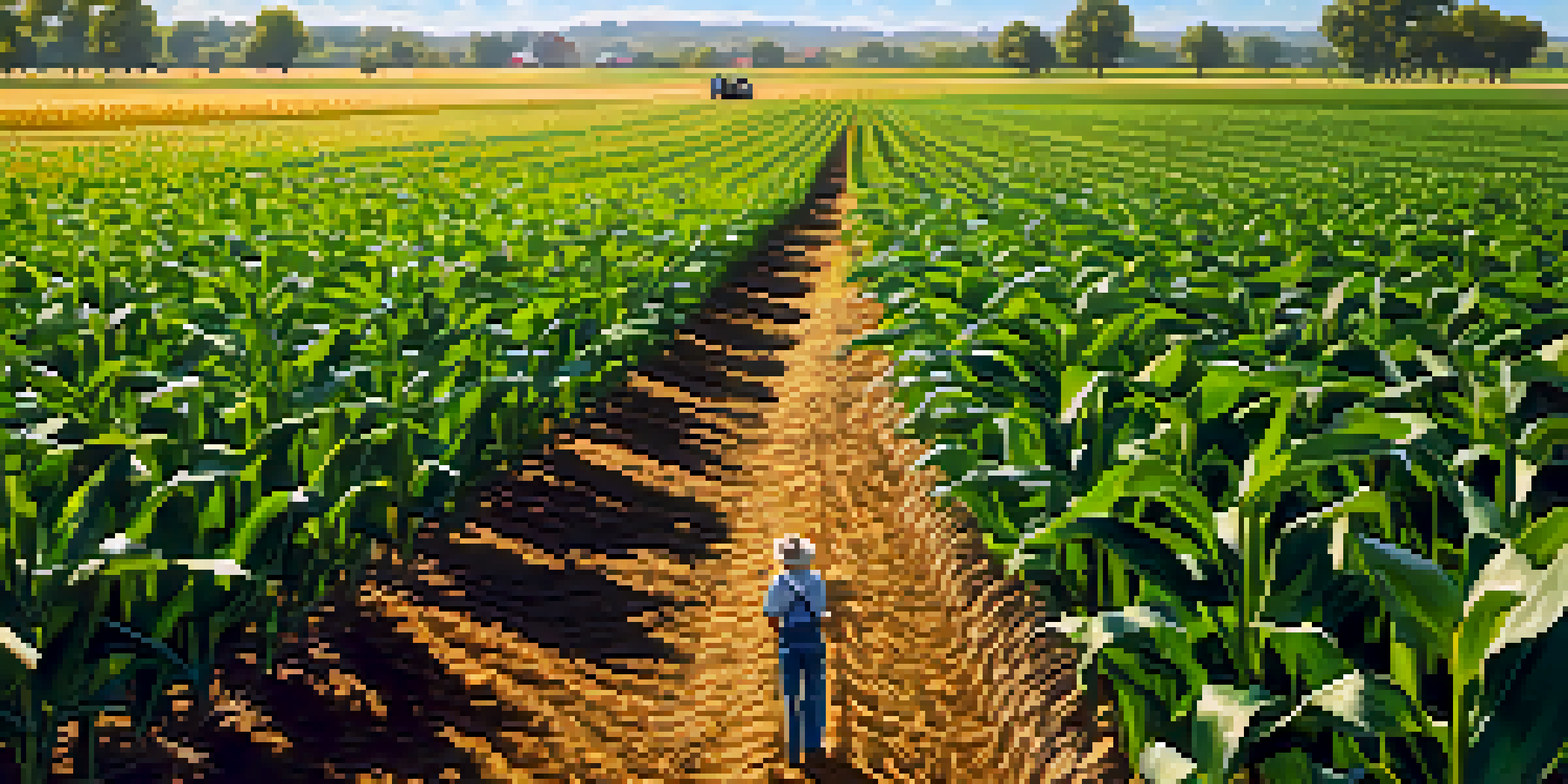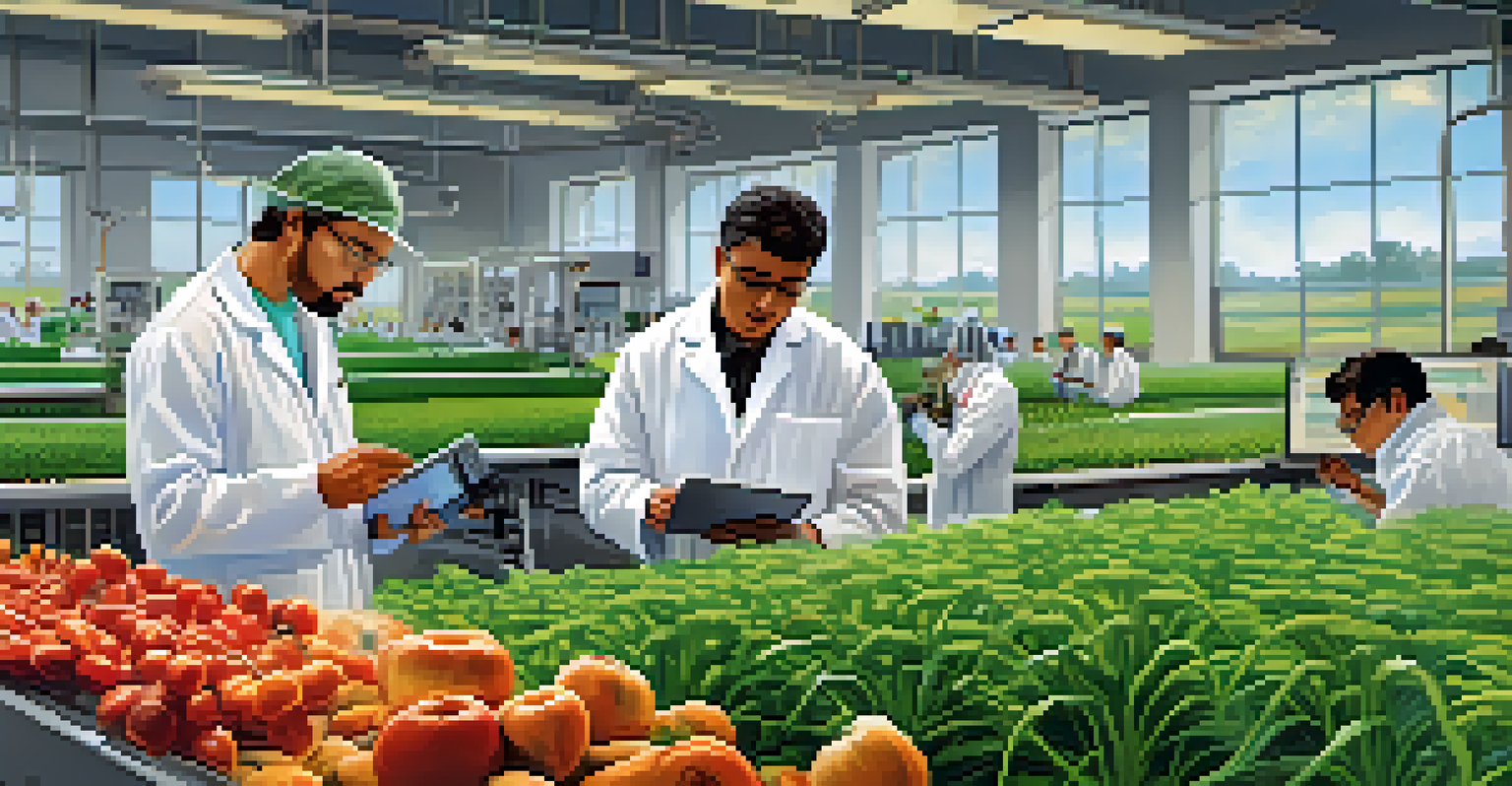Future Food Security: Plant Biotech Innovations on the Rise

Understanding Food Security: A Growing Concern
Food security refers to the availability of food and individuals' access to it. As the global population continues to rise, reaching an estimated 9.7 billion by 2050, ensuring everyone has enough nutritious food is becoming increasingly challenging. Factors such as climate change, resource depletion, and economic disparities contribute to this complex issue, making it a pressing concern for governments and organizations alike.
Food security is not a privilege; it is a right for every person on this planet.
Imagine a world where crops fail due to unpredictable weather patterns or where soil degradation leads to diminished yields. Such scenarios underline the importance of innovative solutions, particularly in agriculture. With traditional farming methods facing numerous obstacles, the need for sustainable and efficient techniques is more critical than ever.
This is where plant biotechnology comes into play, offering a beacon of hope. By enhancing crop resilience and nutritional content, biotech innovations can help address food shortages while promoting sustainable practices. Understanding these advancements is key to grasping how we can secure our food future.
What is Plant Biotechnology?
Plant biotechnology involves using scientific tools and techniques to modify plants, enhancing their traits for better yield, disease resistance, and environmental adaptability. It includes methods like genetic engineering, where specific genes are added or removed to achieve desired characteristics. While this may sound complex, think of it as selectively breeding plants to create stronger, more resilient varieties, but with the added precision of modern science.

For example, scientists can develop crops that require less water or are resistant to pests, reducing the need for chemical pesticides. This not only supports farmers in increasing their productivity but also helps protect the environment. By using biotech methods, farmers can cultivate crops that thrive in challenging conditions, ultimately contributing to food security.
Food Security Faces Major Challenges
As the global population grows, factors like climate change and economic disparities complicate the availability and access to nutritious food.
Moreover, plant biotechnology can also enhance the nutritional value of crops. Imagine rice enriched with vitamins to combat malnutrition in vulnerable populations. These innovations hold the potential to not only feed the growing population but also improve the overall health of communities worldwide.
Innovations in Crop Resilience
One of the key areas of innovation in plant biotechnology is enhancing crop resilience to climate change. With rising temperatures and unpredictable weather patterns, traditional crops often struggle to survive. Biotech advancements allow scientists to develop varieties that can withstand extreme conditions, such as drought or flooding, ensuring that farmers can still harvest viable crops.
Biotechnology is a tool that can help us meet the food and nutrition needs of a growing population sustainably.
For instance, researchers have successfully engineered drought-tolerant corn that can flourish even in arid conditions. This not only secures food supply but also provides farmers with more stable incomes, reducing their vulnerability to climate-related shocks. By investing in these innovations, we’re building a more resilient agricultural system that can adapt to changing environmental conditions.
Additionally, these advancements can lead to reduced reliance on chemical inputs, as resilient crops often require fewer pesticides and fertilizers. This shift not only benefits the environment but also contributes to more sustainable farming practices, aligning with the broader goals of food security.
Enhancing Nutritional Value Through Biotechnology
Another significant innovation in plant biotech is the enhancement of the nutritional profile of crops. Many staple foods lack essential nutrients, leading to health issues like malnutrition. Biotech can help create biofortified crops, which are engineered to contain higher levels of vitamins and minerals, making them healthier options for consumers.
Take Golden Rice, for example, a genetically modified variety enriched with vitamin A. It was developed in response to vitamin A deficiency, which can cause blindness and other health problems, particularly in children. By introducing this rice into communities that rely heavily on rice as a staple, we can significantly improve public health outcomes.
Biotechnology Enhances Crop Resilience
Innovations in plant biotechnology are crucial for developing crops that can withstand environmental stresses, thereby securing food supplies.
These nutritional innovations not only address immediate health concerns but also contribute to long-term food security. By ensuring that the food we produce is not only abundant but also nutritious, we can tackle the dual challenges of hunger and malnutrition head-on.
The Role of Policy in Plant Biotech Adoption
While the benefits of plant biotechnology are clear, the role of policy in its adoption cannot be overlooked. Governments play a crucial part in establishing regulations that either promote or hinder the development and use of biotech crops. Supportive policies can lead to faster innovation and widespread adoption, whereas restrictive regulations can slow down progress.
For instance, countries that embrace biotech crops often see increased agricultural productivity and economic growth. This can lead to a more secure food supply for their populations. Conversely, nations that impose heavy restrictions may struggle to keep up with food demands, especially in the face of climate challenges.
It's essential for policymakers to engage with scientists, farmers, and communities to create frameworks that encourage safe and responsible biotech research and deployment. By fostering an environment that supports innovation, we can ensure that plant biotechnology contributes effectively to food security.
Public Perception and Acceptance of Biotech Foods
Public perception of biotechnology plays a significant role in its acceptance. While many recognize the potential benefits, there are also concerns about safety, ethics, and environmental impact. This skepticism can hinder the adoption of biotech crops, making it vital to engage in open conversations about the science behind these innovations.
Education is key to bridging the knowledge gap. By providing clear, accessible information about how biotech works and its benefits, we can help alleviate fears and misconceptions. For example, sharing success stories from farmers who have adopted biotech crops can illustrate their real-world advantages.
Public Perception Shapes Biotech Use
Engaging the public through education and transparency is essential for fostering acceptance of biotechnology in addressing food security.
Moreover, transparency in labeling biotech foods can help consumers make informed choices. By fostering a culture of trust and understanding, we can pave the way for broader acceptance of biotech innovations as a vital tool in achieving food security.
The Future of Plant Biotech and Food Security
Looking ahead, the future of plant biotechnology holds immense promise for addressing food security challenges. As researchers continue to innovate, we can expect the development of crops that not only yield more but also provide essential nutrients and withstand climate stresses. These advancements will be crucial as we strive to feed a growing population sustainably.
However, the successful implementation of biotech solutions will require collaboration among scientists, policymakers, farmers, and consumers. By working together, we can create a food system that embraces innovation while prioritizing safety and sustainability. The dialogue around biotechnology must remain open and inclusive, ensuring that all voices are heard.

Ultimately, the integration of plant biotechnology into our agricultural practices is not just a possibility; it is a necessity for a food-secure future. By embracing these innovations, we can build resilience, enhance nutrition, and ensure that everyone has access to the food they need to thrive.